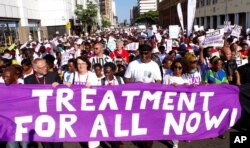As the curtain fell Friday on the 2016 International AIDS Conference in South Africa, organizers challenged delegates to go back to their countries and start the hard work toward an ambitious goal: ending the pandemic by 2030.
After five days of discussions on key topics like stopping new HIV infections, getting treatment for the infected and finding a vaccine to end AIDS for good, it was time for delegates to return home Friday.
Despite the tremendous strides made since the first International AIDS Conference 21 years ago, the epidemic has killed tens of millions, infected tens of millions and continues to infect millions more.
More than 1 million AIDS-related deaths were recorded last year. Seventeen million infected people are receiving antiretroviral drugs, while 20 million more are going untreated.
This led organizers of the conference to challenge all nations of the world and their citizens to stand up and turn the tide.
“We need to heed the call to start a social justice movement that aims to reinvigorate the HIV response similar to the global anti-apartheid movement that we had,” said Olive Shisana, the local co-chair of this year’s conference.
South African Minister of Health Aaron Motsoaledi called for a global campaign led by young people to bring about a new generation free from HIV.
“A global campaign led by young people is urgent. If we don’t, we will not be able to achieve a generation free of HIV/AIDS by 2030,” said Motsoaledi.0
The United Nations AIDS agency emphasized that implementation of all issues agreed upon at the conference was key in ensuring AIDS is eliminated. The incoming president of the International AIDS Society, Linda-Gail Bekker, made a passionate plea to donors.
“Whether people live or die in many countries will depend on how donors respond to the Global Fund’s call to action. Lives depend on the Global Fund,” said Bekker.
The message to all delegates was clear: The conference might be over, but the hard work has just begun.













